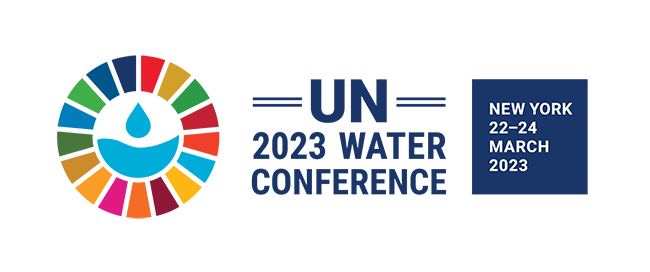UN 2023 WATER CONFERENCE
The United Nations (UN) 2023 Water Conference to be held March 22-24 in New York City is being eyed as a platform to raise awareness, define a roadmap and advance the water agenda.
The UN will be organising it with support from the governments of Tajikistan and the Netherlands.

The conference, formally known as the 2023 Conference for the Midterm Comprehensive Review of Implementation of the UN Decade for Action on Water and Sanitation (2018-2028), aims to raise awareness on the global water crisis and decide on concerted action to achieve the internationally agreed water-related goals and targets.
It will focus on ensuring that countries deliver on promises already made and are designed to be action-oriented, inclusive and cross-sectoral. The three-day conference will feature an opening and closing ceremony, six plenary meetings and five multi-stakeholder interactive dialogues.
Water for health
Ensuring availability and sustainable management of water and sanitation for all has been a long-time topic at the United Nations. Water and sanitation are at the core of sustainable development and the range of services they provide underpin poverty reduction, economic growth and environmental sustainability.
The world needs to transform how it manages its water resources and delivers water and sanitation services to billions of people.
Over the past several decades, the frequency and intensity of local water crises have been increasing, with profound implications for public health, environmental sustainability, food and energy security and economic development.
To reach universal access to drinking water, sanitation and hygiene by 2030, the current rates of progress would need to increase fourfold. Achieving these targets would annually save 829,000 people who die every year from diseases directly attributable to unsafe water, inadequate sanitation and poor hygiene practices.
Water for sustainable development
Water is a key socio-economic driver for sustainable growth, livelihood, justice, food security and labour. The dialogue would emphasise that access to a clean and sustainable water source is currently gravely imbalanced.
The conference will focus on valuing water, the water-energy-food nexus and the role of the resource in sustainable economic and urban development.
Water availability is a global challenge, yet one whose solutions must be understood and implemented at local, national, regional and global levels.
The Sustainable Development Goals (SDG) are intricately linked to access to water, the reliability of water supply, impacts upon shared water resources and innovations to support the co-management of shared water resources in a way that does not diminish the ability of current and future generations to benefit from this fragile resource.
Water for climate, resilience & environment
Increasing climate extremes and variability, coupled with unsustainable growth and consumption, are leading to more severe and frequent water-related disasters and risks, worsening environmental degradation, including pollution, increasing water temperatures and ecosystem loss and profoundly affecting economies, societies and the environment. This, in turn, undermines the natural ability of ecosystems to combat both the causes and impacts of climate change.
An increase in global warming is projected to exacerbate risks to ecosystems and humans; nine out of ten disasters triggered by natural hazards during the last decade were water-related.
Due to their water-dependent nature, food security, human health, urban and rural settlements, energy production, industrial development, economic development and ecosystems are increasingly vulnerable to the impacts of climate change. At the same time, responses to climate change also impact water resources and hydrological processes.
Key issues, challenges and trends related to water and interlinked topics — climate change, disaster resilience, marine ecosystem and biodiversity — will be an important point of discussion in the upcoming conference.
Water for cooperation
Water more often unites than divides. Water cooperation across borders and sectors has proven to generate benefits that accelerate progress across SDGs, including delivering safe drinking water and sanitation, enhancing food security, and sustaining healthy livelihoods and ecosystems.
It helps address resilience to climate change, reducing disaster risk, providing renewable energy, supporting cities and industry and fostering regional integration and peace. Water cooperation should be inclusive, cross-sectoral and also action-oriented.
There is a cost of non-cooperation, also considering that water conflicts persist. Unilateral action by communities, sectors and countries can lead to unsustainable and often more costly development choices.
If left unaddressed, they can even spiral into threats of regional stability and peace, especially within the context of weak governance systems and situations of fragility, conflict and violence. Hence, progress on water cooperation must be accelerated.
Water Action Decade
The 2022 Secretary-General’s Report on the mid-term review of the decade highlighted accomplishments over the first five years and pinpointed some key actions, events and lessons learned.
There’s a vision to provide ideas on how to move forward to make the decade successful and help achieve SDG 6 and other water-related goals and targets. It also explored how the outcomes of the previous events and initiatives at the midway point can accelerate progress in the next five years of the decade.
Member states and relevant stakeholders will submit voluntary commitments, also known as the Water Action Agenda, at the conference. It will provide an avenue through which continued and hopefully accelerated progress can be made in achieving the objectives of the decade, SDG 6.
The year 2023 is not only the middle of the decade but also the middle point of the 2030 Agenda. Hence, the state of the progress towards the SDGs in the first seven years of the 2030 agenda period is closely related to the progress towards the decade’s objectives.
Source: Curtain raiser: Here is what we can expect from the upcoming UN 2023 Water Conference
|